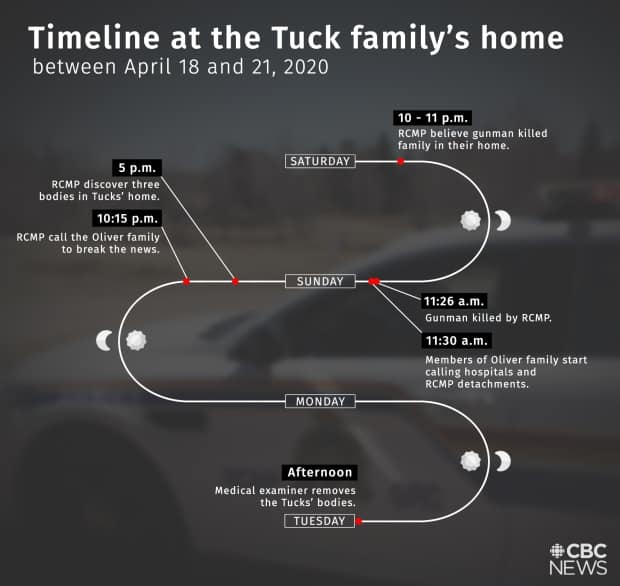RCMP took 19 hours to find parents, daughter killed in Nova Scotia mass shooting in April

Tammy Oliver-McCurdie lost her younger sister, Jolene Oliver, in last April's mass shooting in Portapique, N.S., and her worst fear remains that the 39-year-old woman, her husband, Aaron Tuck, 45, and their 17-year-old daughter, Emily, lay injured for hours.
The family of three were among the 13 people killed on April 18 in their tiny subdivision in rural Nova Scotia, about 130 kilometres north of Halifax. A gunman went on to kill nine more people the following morning in what became one of the worst mass killings in Canadian history.
A police officer shot and killed the man responsible at a gas station in Enfield, N.S., on Sunday, April 19 at 11:26 a.m., after the gunman travelled about 195 kilometres.
During a teleconference on July 3 with the Oliver family, who live in Alberta, the RCMP said they didn't discover the couple and their daughter until 5 p.m. on April 19 — 19 hours after investigators believe they were killed.
By that point, family members had been frantically calling and looking for information for hours, pleading with the RCMP to send an officer to check on their loved ones.
Police assured the Oliver family they did not suffer, though the final reports from the Nova Scotia medical examiner about how exactly they died are still not complete.

"Always what goes through your mind is how long did they lay there for alive?" Oliver-McCurdie said in an interview with CBC News. "The best story is yes, they went fast. But what if they didn't?"
CBC's The Fifth Estate investigated and found that while the RCMP did tell some residents to leave their homes late on April 18, they left others in the community to sleep through the night, unaware a neighbour had gone on a shooting spree.
Families have questions about delays
The Oliver family is among several that lost loved ones in the rampage who have raised questions about how the RCMP responded and why it took so long to confirm the deaths.
Oliver-McCurdie said she still doesn't understand the delay, given that the subdivision is small and police arrived Saturday night. The Oliver-Tuck home was located about two kilometres from the entrance to the community.
"I would hope that police would check the house to see if everyone was OK, especially if they're missing the shooter. So a lot of questions and a lot of anger coming out of that piece for me and my family," she said.
"I'm upset over it. It makes no sense when it comes to a public safety standpoint, it makes no sense."
At the July 3 meeting, RCMP investigators said officers in Portapique were still in the process of clearing homes on the Sunday afternoon, which is why it took so long to get to Oliver and Tuck's house. They also said at the meeting that on the day after the shooting, they were concerned about properly identifying victims and not releasing incorrect information.
WATCH | Thirteen Deadly Hours: The Nova Scotia Shooting:
The Oliver family, calling from Red Deer, Alta., on the Sunday, became frantic after Jolene didn't pick up her mother's daily phone call while they have their morning coffee. Aaron and Emily Tuck also didn't respond to calls, texts or Facebook messages.
Before noon Nova Scotia time, the family had heard there was a situation in Portapique and had begun calling the RCMP and hospitals. Twelve hours later — five hours after police say they discovered the family — an RCMP officer finally contacted them to pass on the horrific news.
Oliver-McCurdie said that by then, she, her other sister and parents assumed the worst but had still wondered if somehow the family of three had managed to escape.
"It's one thing to find out that your family is dead and have the confirmation, and it's another excruciating piece to wait in limbo for confirmation," she said.
"You have all these officers, you're supposed to have all these resources. There's no reason why someone couldn't have just driven down there [and checked the house].... After a dozen or more phone calls my family made during the day, it doesn't make sense."
By Sunday night, the police were dealing with 16 crime scenes in several communities. Investigators told the Oliver family that the medical examiner couldn't move the bodies from the home until Tuesday afternoon — a further delay that Oliver-McCurdie said caused them grief and anxiety.
Mass shooting subject of public inquiry
The RCMP declined to answer any questions from CBC News about the case, citing an ongoing public inquiry into the mass shooting called by the provincial and federal governments.
"The RCMP recognizes the need to provide the factual account of what transpired this past April. With the public inquiry now ongoing, the most appropriate and unbiased opportunity to do so is with our full participation in the inquiry," Cpl. Lisa Croteau said in an emailed statement.
The inquiry's final report isn't expected for two more years.

In the meantime, Oliver-McCurdie said, her family decided to speak out about the details of the deaths of her sister, brother-in-law and niece — and the questions that remain — to promote discussion about how policing in rural areas could be improved and how April's tragedy might have been prevented.
She said she would also like police forces to tighten the rules and limit access to their own logos and equipment. The shooter — Gabriel Wortman, 51, a denturist with a clinic in Dartmouth — purchased decommissioned police cars and gear online and used them to masquerade as a Mountie. Information on the specifications for the graphics on RMCP cruisers remains publicly available.
"If a positive piece is better public policy, better safety, for those living in Canada ... that makes their deaths ... a little bit easier if we can do better as a society and do better with protecting people in Canada. That needs to be the aim," Oliver-McCurdie said.
'They did everything, just the three of them'
Jolene Oliver, who grew up in Alberta, moved east with her husband and daughter seven years ago to be closer to Tuck's parents. But she left behind a miniature Christmas village she loved, and Oliver-McCurdie said she has been trying to find a way to display her sister's collection.
Oliver worked as a restaurant server because she loved interacting with people — being there to listen to them, support them and make sure they got home safely, her sister said.

"She made the best of everything she ever had. A really unique outlook on life, a very positive outlook on life."
In Portapique, Oliver-McCurdie said, Jolene loved walking along the shore of Cobequid Bay and would insist on taking a proper picnic basket for the family's snacks.
"They did everything, just the three of them," she said.
The family moved into a home that didn't have electricity, and they spent months working on it together. When they needed a washing machine, Aaron Tuck was industrious enough to find a solution, Oliver-McCurdie said.
"He just had that knack, that creative art with welding and wood and things and just understanding them. He had a very great mechanical mind that he could come up with an invention for almost anything," she said.
Emily Tuck spent time in the garage with her father, learning about motors and welding. Like Aaron, Emily also had a creative side and loved playing her fiddle.
WATCH | Emily Tuck plays the violin:
"She made a lot of art and a wrote a lot of poems," Oliver-McCurdie said. "She's a really unique kid and a really unique outlook. She's was a lot of fun."
For now, as the Oliver family wait for answers, they continue to grieve. In Alberta, they planted three oak trees from Nova Scotia's Colchester County in memory of the branch of their family they've lost.

